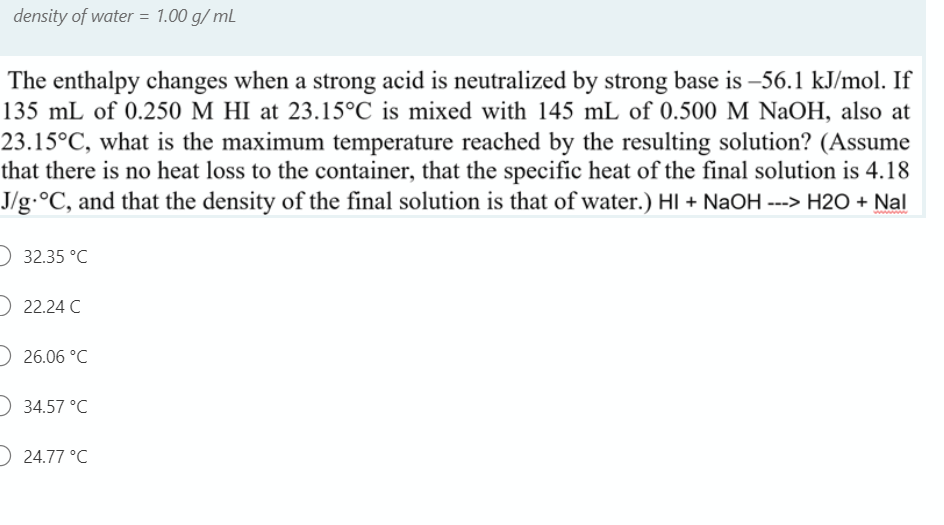density of water = 1.00 g/ mL The enthalpy changes when a strong acid is neutralized by strong base is –56.1 kJ/mol. If 135 mL of 0.250 M HI at 23.15°C is mixed with 145 mL of 0.500 M NaOH, also at 23.15°C, what is the maximum temperature reached by the resulting solution? (Assume that there is no heat loss to the container, that the specific heat of the final solution is 4.18 J/g•°C, and that the density of the final solution is that of water.) HI + NaOH ---> H2O + Nal ) 32.35 °C O 22.24 C 26.06 °C 34.57 °C O 24.77 °C
density of water = 1.00 g/ mL The enthalpy changes when a strong acid is neutralized by strong base is –56.1 kJ/mol. If 135 mL of 0.250 M HI at 23.15°C is mixed with 145 mL of 0.500 M NaOH, also at 23.15°C, what is the maximum temperature reached by the resulting solution? (Assume that there is no heat loss to the container, that the specific heat of the final solution is 4.18 J/g•°C, and that the density of the final solution is that of water.) HI + NaOH ---> H2O + Nal ) 32.35 °C O 22.24 C 26.06 °C 34.57 °C O 24.77 °C
Chemistry
10th Edition
ISBN:9781305957404
Author:Steven S. Zumdahl, Susan A. Zumdahl, Donald J. DeCoste
Publisher:Steven S. Zumdahl, Susan A. Zumdahl, Donald J. DeCoste
Chapter6: Thermochemistry
Section: Chapter Questions
Problem 64E: A 110.-g sample of copper (specific heat capacity = 0.20 J/C g) is heated to 82.4C and then placed...
Related questions
Question

Transcribed Image Text:density of water = 1.00 g/ mL
The enthalpy changes when a strong acid is neutralized by strong base is –56.1 kJ/mol. If
135 mL of 0.250 M HI at 23.15°C is mixed with 145 mL of 0.500 M NaOH, also at
23.15°C, what is the maximum temperature reached by the resulting solution? (Assume
that there is no heat loss to the container, that the specific heat of the final solution is 4.18
J/g•°C, and that the density of the final solution is that of water.) HI + NaOH ---> H2O + Nal
O 32.35 °C
D 22.24 C
26.06 °C
) 34.57 °C
) 24.77 °C
Expert Solution
This question has been solved!
Explore an expertly crafted, step-by-step solution for a thorough understanding of key concepts.
Step by step
Solved in 3 steps

Knowledge Booster
Learn more about
Need a deep-dive on the concept behind this application? Look no further. Learn more about this topic, chemistry and related others by exploring similar questions and additional content below.Recommended textbooks for you

Chemistry
Chemistry
ISBN:
9781305957404
Author:
Steven S. Zumdahl, Susan A. Zumdahl, Donald J. DeCoste
Publisher:
Cengage Learning

Chemistry: An Atoms First Approach
Chemistry
ISBN:
9781305079243
Author:
Steven S. Zumdahl, Susan A. Zumdahl
Publisher:
Cengage Learning


Chemistry
Chemistry
ISBN:
9781305957404
Author:
Steven S. Zumdahl, Susan A. Zumdahl, Donald J. DeCoste
Publisher:
Cengage Learning

Chemistry: An Atoms First Approach
Chemistry
ISBN:
9781305079243
Author:
Steven S. Zumdahl, Susan A. Zumdahl
Publisher:
Cengage Learning


General Chemistry - Standalone book (MindTap Cour…
Chemistry
ISBN:
9781305580343
Author:
Steven D. Gammon, Ebbing, Darrell Ebbing, Steven D., Darrell; Gammon, Darrell Ebbing; Steven D. Gammon, Darrell D.; Gammon, Ebbing; Steven D. Gammon; Darrell
Publisher:
Cengage Learning

Chemistry by OpenStax (2015-05-04)
Chemistry
ISBN:
9781938168390
Author:
Klaus Theopold, Richard H Langley, Paul Flowers, William R. Robinson, Mark Blaser
Publisher:
OpenStax

Chemistry for Today: General, Organic, and Bioche…
Chemistry
ISBN:
9781305960060
Author:
Spencer L. Seager, Michael R. Slabaugh, Maren S. Hansen
Publisher:
Cengage Learning